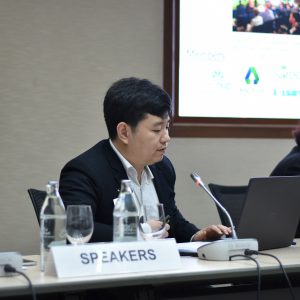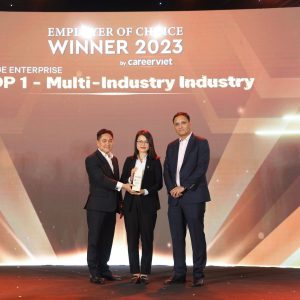AnEco compostable product series are currently targeted towards its domestic market to head up the emerging green consumption trend upon full export to the international market.
As a great expectation of An Phat Holdings, such shift is known as a bet on the domestic emerging trend of compostable product consumption that acknowleged by the Chairman Pham Anh Duong that “We are once again startup as being one of the first local manufacturer of compostable starch products in Vietnam.”
Vietnam is named among five countries in the world with the most plastic waste discharged into the ocean, 1.8 million tons annually, as recently released by the Food and Agriculture Organization of the United Nations (FAO). A series of programs and events were organized throughout the last year to encourage the local community and businesses to give a hands in dealing the plastic waste problem and environmental protection.
In a recent agenda on plastic waste management held in HCMC, Mr. Nguyen Thanh Phuong, Deputy General Director of Vietnam Environment Administration revealed that the market recently recognized the contributions of several large enterprises, especially retail chains with initiatives for reducing the use of plastic products and alternating with eco-friendly products.
“Finally, Vietnam has welcomed the first compostable starch bag manufacturer, which is absolutely a great signal to be widespread,” shared by Mr. Phuong. The manufacturer mentioned by Mr. Phuong was An Phat Bioplastics., JSC (AAA) – a member of An Phat Holdings, one of the major thin-film coated plastic wrap manufacturers in Southeast Asia.

Mr. Pham Anh Duong revealed that AnEco compostable products have been researched and developed since 2015 as it had already recognized that this would be the world’s hottest trend. Emerging in Europe, this trend was widely spread to US and other countries, including Vietnam.
Compostable products were deemed to be environmentally friendly as they are made of 100% organic materials, mainly starches of all types, such as corn, potatoes, and cassava. After it become garbage which was naturally buried or applied with industrial composting treatment and absorbed by microorganisms, it would subsequently decomposes into humus, CO2 and water as soil fertilizers.
“This is the most crucial mechanism of ‘compostable’ products, such term is used in Europe for completely biodegradable products without ambiguities with “more eco- friendly” products whose nature are still plastic,” further explained by the Chairman.
After AnEco products were widely exported to numerous countries worldwide, by the end of 2018, AnEco returned to the domestic market. In a private interview with Forbes Vietnam, Mr. Pham compared that by releasing AnEco products into the domestic market after a period of time “bringing the bell to beat the country”, An Phat Holdings “once again became a…startup” in its home market.
The differences between a production line of biodegradable products and traditional plastic products were found in raw materials, while production technologies were basically not too different as shared by Mr. Duong. Conventional plastic products were made of petrochemical materials while biodegradable products were made by a polycondensation procedure, which separated acids from organic matters. Having an organic origin, storage of such product category was also relatively different from the traditional plastics, which required adequate moisture to keep the product from being degraded.
AnEco has just joined the domestic market since 2018, and its presence is currently represented by a relatively low proportion compared to An Phat Holdings’ conventional plastic products. “It accounted for only about 10%” as compostable bags’ price was much higher, 2.2-2.5 times or more, than conventional plastic bags as what referred by Mr. Duong. “Although the consumer awareness is currently not high, the revenue growth of over 15%/p.a is absolutely positive to us,” unveiled by Mr. Duong.
Highly valuing the domestic consumption potetnial, Mr. Duong expected that in the next five years, 50-60% revenue of plastic segment shall be obtained from this biodegradable product range. The company’s total plastic output is currently around 9,000 tons per month, which means this new product range is expected to account for approximately 4,500 tons per month.
Mr. Duong confidently expressed his ambition of having the domestic revenue reached 30-40% of the Corporation’s revenue structure in plastic segment. The confidence was derived from AnEco’s key products, including shopping bags, cutlery, straws, gloves, tablecloths, compostable film coated paper cups, etc., and products related to children’s toys and compostable biological materials, so-called as AnBio, to supply to other manufacturers.
Mr. Duong unveiled that there are currently around 10 companies producing compostable bioplastic beads in the world, which is an indispensable factor to produce biodegradable products. The material are always “out of stock”, which even make people unable to buy without “queuing”. As a result, manufacturers will take advantages to “create their chain from raw materials to finished products.”
Currently, its customers are some small supermarkets and restaurants in Hanoi. However, Mr. Duong obviously expressed his optimistic with this new direction by saying that he was negotiating for a contract entry with the chain of Vinmart supermarket, or with big customers such as Vinamilk, Vietnam Airlines and other major supermarket chains. “Hopefully, just by the end of this year, the Vietnamese market will be offered with more products,” said by Mr. Duong.
Exchanging with Forbes Vietnam, Dr. Nguyen Lan Dung, the Standing Vice President of the Vietnam Union of Biology Associations, unveiled that the eco- friendly concept is currently understood in several ways. If some products are “user-friendly”, they might be just user-friendly, not safe. As compostable products were introduced in the market, the used conventional plastic products is expected to reduce.
Source: Forbes Vietnam



